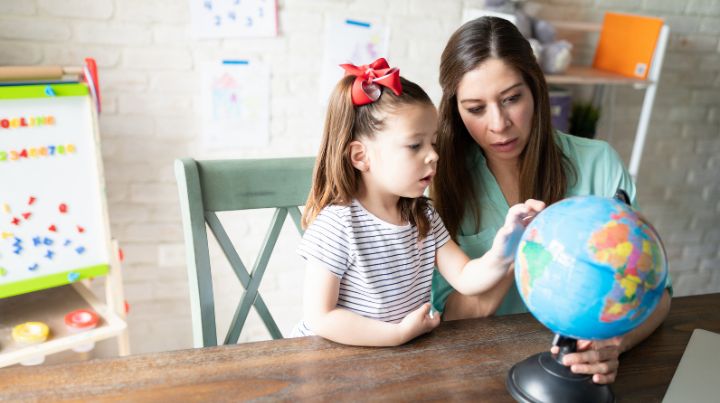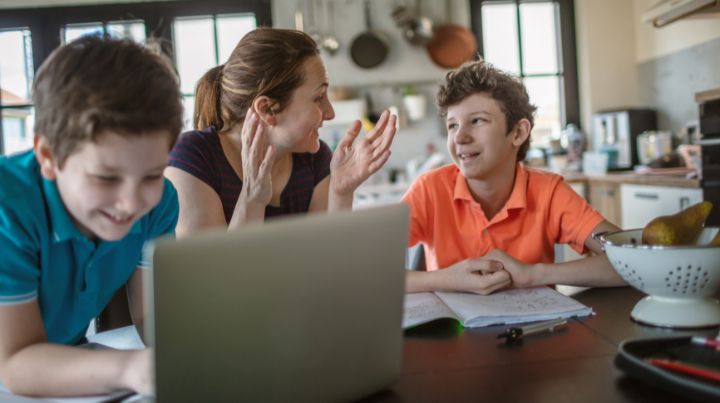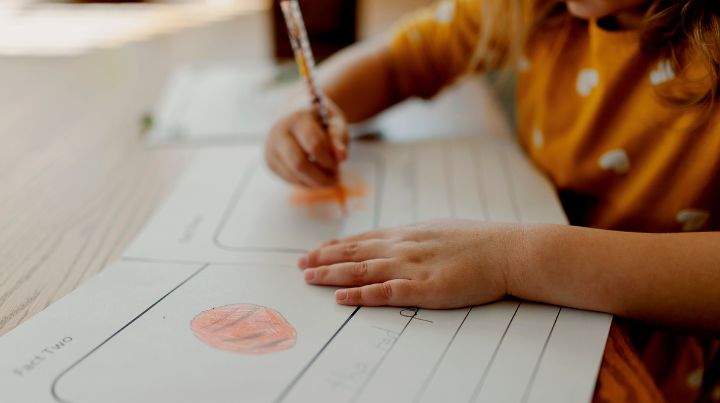Homeschooling as a Public School Alternative

School's out! Most children are probably ready to shut their brains off for the summer, but as parents, we're always thinking about what comes next, and maybe you're thinking about making the switch to homeschooling.
I have been homeschooling for over a decade. While homeschooling was on the rise even before the Covid-associated school closings, interest has skyrocketed in the past three years. I'll share the most common questions I get from parents who are considering educating their kids at home.
What Rules Do You Have? Do You Have to Tell the Public School?
Every state is different. The Home School Legal Defense Association put out this helpful guide. You can pick your state from the interactive map and then see what the rules are. Homeschooling is difficult in the Northeast, but in most of the country, parents have quite a bit of flexibility.
When I homeschooled in Texas, all I did was not sign up my kids for the public elementary school. I didn't notify anyone; I didn't have to submit testing. The assumption in Texas was that most parents wouldn't want their kids permanently mooching off them and would do enough on their own to prepare children for the workforce.
Now, I live in one of the states where we're required to notify the school district and then submit standardized tests every other year. I usually mail my Notice of Intent in August, though one year I forgot until the following spring. I didn't get in any trouble. My state has been reasonable if the children are visibly happy, healthy, and learning.
The horror stories I have heard about Child Protective Services doing random house calls or parents getting into trouble for taking kids to stores or restaurants during school hours have exclusively come from either Pennsylvania or New York. The rules surrounding homeschooling in these states are very stringent; I have met multiple people that have left those states precisely because they wanted to homeschool and did not want to deal with the bureaucracy.
But most states are far more amicable toward homeschooling, and as homeschooling becomes more common, I think that trend will continue.
How Do Your Kids Socialize?
Church. Sports. Music. Scouts. Homeschool co-ops. Neighbors. These are all ways in which my children have met friends in the 10+ years I've been homeschooling. Some homeschoolers predominantly socialize with their church members, but it definitely does not have to be that way.
If all these activities sound expensive, they don't have to be. Many school districts allow kids to opt-in for activities like sports or band at no more cost than the same activity fees the kids attending school pay. My kids have been doing track and cross country at the local high school for years, and it's been a wonderful experience. If you contact the athletic director (or band director) of your local high school, they can explain what your options are.
What Kind of Homeschooling Programs Do You Use?
Personally, I had been long intrigued by classical education, and when I read Susan Wise Bauer's The Well Trained Mind, I loved it. I didn't follow her program stringently, but I bought learning materials for my children based on her recommendations (Explode the Code for phonics, Saxon Math, First Language Lessons for grammar). My kids have thrived.
But you don't have to do classical! It works well for my household because I am naturally organized. I like having a daily routine, and when my kids were young and I was married, I had a spouse that also liked routine. But there are so many programs out there. Charlotte Mason, Waldorf, Classical, Montessori, and Unschooling are all different approaches to take. Some people get a bug in their ear about one type, start researching, and run with it.
If you want to homeschool but picking a style sounds overwhelming, you can sign up for various online schools, like Khan Academy. I live in a state that offers a free online homeschool option through the public school system. We also have an “Options” program, where kids can attend class one day a week with other homeschooled kids to take classes like science and art that may be more difficult at home.
If you don't have free programs available to you, there are other fairly inexpensive online schooling options, too, some of which are ranked here. You can also purchase entire curricula from places like Memoria Press, Rod and Staff, or Oak Meadow though this is usually not the cheapest option.
How Do You Teach Middle Schoolers Math?
I was always good at math and science, so middle school math did not intimidate me. I was able to familiarize myself with what my children needed to know fairly quickly. However, this is a legitimate concern for many people.
Some years back, there was discussion about the “math gap,” the finding that while homeschooled children scored above average in most subjects, they were often behind on math. One of the biggest reasons I put my kids in high school was that I did not want to spend an hour or more every day re-teaching myself calculus so I could teach it to them.
But help is available. Math is one of the most popular classes people sign up for in my state's Options program because it gives children one day a week to get questions answered by a real math teacher. Other parents hire tutors, though this is not cheap. If your math is weak, spend time asking other homeschoolers in the area what they do. Most homeschoolers are pretty passionate about homeschooling. The key is the willingness to meet new people and to recognize when to ask for help.
How Do You Meet Other Homeschoolers?
When I lived in Texas, homeschooling was so common that a high percentage of the women I saw hanging out at playgrounds also happened to homeschool. But that's not the case everywhere.
Many churches have homeschool groups, though sometimes it can be hard finding one that's a good fit for your family. I actually had to change churches after I got divorced. It was worth the switch, but difficult at the time.
If you're not a church-goer, or your church doesn't have homeschool groups, the HSLDA website has a tool you can use to find homeschool groups in your area here. If you want more guidance teaching particular subjects, a local homeschool group is your best bet for finding help.
Is It a Ton of Work? Do You Like It?
Yes, and yes. While each kid in the elementary years really only needs between one and two hours of instruction to be at or above grade level educationally, you will be responsible for what your kids do every day. If you have lots of little boys, this means getting energy burnt off without gym class or recess. I got very, very familiar with lots of playgrounds when my children were small.
Learn to love your local library, assuming it is safe. If it is not safe, see if they are willing to hire a security guard. I had to stop using my library for some time because of aggressive homeless people, but after the library hired security, it became a lot nicer.
The most important parts of homeschooling in the elementary years are making sure your kids are confident readers, imparting basic math skills, and then showing them that learning new things is fun. If they can read well, and if they've developed a curiosity about the world around them, they will be able to integrate into high school, college, or whenever you decide it's time for them to attend school.
Establishing daily and weekly routines make life a lot easier for most people. We often did the bulk of our school work in four days, leaving one day for outings, appointments, or more extensive farm projects. We always tackled math first thing in the morning. I gave the kids long lunch breaks, usually two hours or so, because it gave me a chance to have another round of coffee and grade papers while they ran around outside. Doing much of the grading in the middle of the day meant I didn't have as much to look over in the evenings.
So, yes, it was a ton of work. But now that I'm mostly done, I can say I truly have no regrets. My kids have been able to integrate into high school and the workforce, and they do well. They're not perfect, and neither am I, but we all like each other, and homeschooling facilitated that.
Final Thoughts
People consider homeschooling for all kinds of reasons. A big one is financial. Many parents know they can't afford a good school district but still want their kids to have a good education. Homeschooling gives lower-income families a way to work around that.
Other people are concerned about the values being taught in public schools. Some schools are so aggressively pushing the LGBTQ agenda that students in a Massachusetts school actually staged a revolt, chanting, “My pronouns are USA!”. Homeschooling gives you control over what values get imparted to your children.
Other people just have odd kids that don't fit in well. That was why I started homeschooling, back when I lived in a good school district in Texas. I sent my oldest child to the public kindergarten, and he just could not behave. He needed extra time to mature, and I was at home with my younger children anyway, so homeschooling made sense.
I loved public school when I was a kid, but the world has changed a lot. If you are concerned about future lockdowns, summer is the perfect time to look into homeschooling. See if any groups are close to you and look into what programs might appeal to your children.
Most of us aren't preparing because we think it's cool; we're preparing because we have young people we're responsible for. Exploring other options for educating your children in the event of unreliable public school schedules can be part of general preparedness.
Additional Resources:
Related Articles
FREE Guide
Read the Best Seller
Join Mind4Survival
Stay informed by joining the Mind4Survival! 100% Secure! 0% Spam!
Affiliate Disclosure...
Mind4Survival is a free, reader-supported information resource. If you make a purchase through our link, we may, at no cost to you, receive an affiliate commission.
Do You Want To Be Ready No Matter What?

Download our free 39-page guide with interactive, 7-Day Emergency Kit Checklist and take the first step toward real preparedness.
- Know exactly where to start.
- Save time and money.
- How-to build a complete Basic Emergency Kit.
- Level up your safety and security.
Join Mind4Survival
Stay informed by joining the Mind4Survival! 100% Secure! 0% Spam!








